Soccer newsletter: Why an expanded MLS playoff is wrong on so many levels
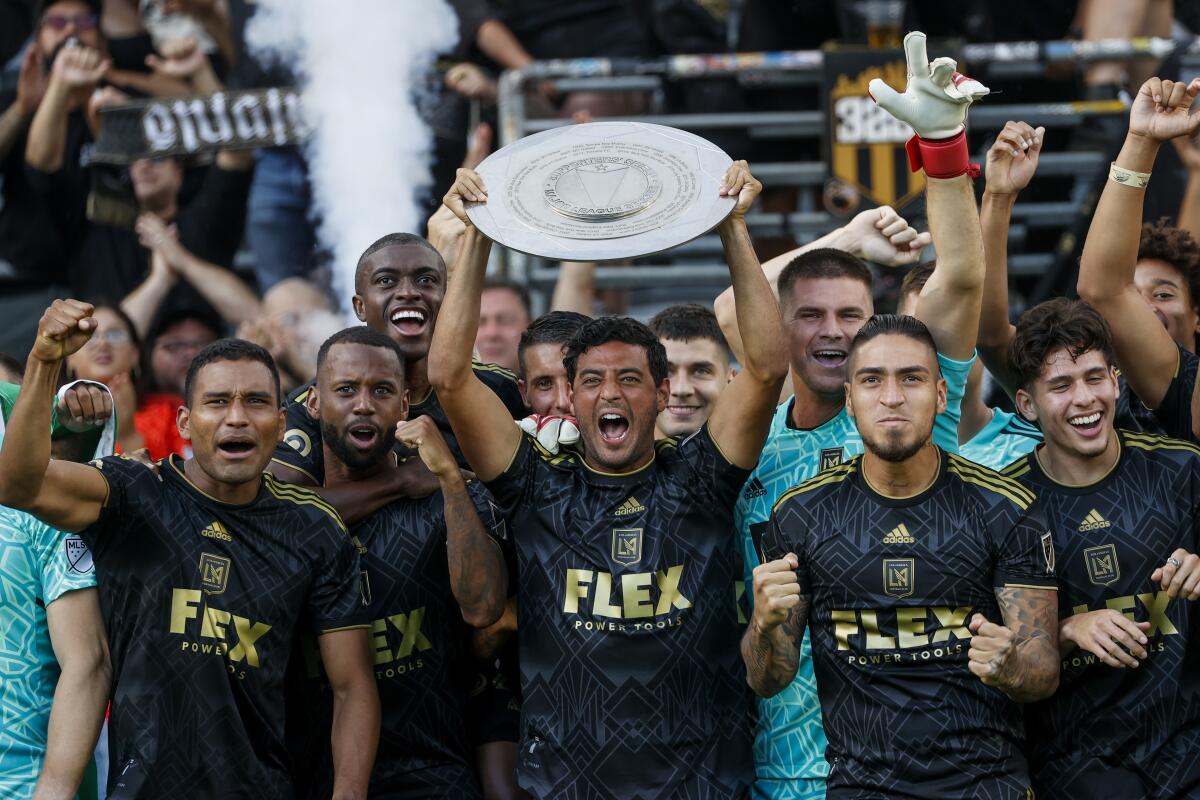
- Share via
Hello and welcome to the final edition of the weekly L.A. Times soccer newsletter, about which more later. I’m Kevin Baxter, the Times’ soccer writer, and this is going to be an MLS-heavy goodbye newsletter since we’re going to look at the league’s new postseason format, the prospects for continued expansion and how Saturday’s postponement favors the Galaxy. In non-MLS news, we’ll talk about the U-17 national team qualifying for the World Cup for a record 18th time and Alex Morgan becoming the most prolific soccer mom in USWNT history.
But we start with the MLS playoff format. The league kicked off its 28th regular season Saturday, not that it matters much. The regular season, that is. Less than a week before the first games were played, MLS unveiled a new playoff format, its third since 2018, that guarantees 18 of its 29 teams a postseason invitation.
The league will play a 34-game schedule to eliminate just 11 teams; among U.S. professional sports leagues only the NBA is more generous in handing out postseason invitations. Nor does the new format offer much reward for the two conference’s regular-season champions. In seasons past, the teams that finished atop the conference tables received a first-round playoff bye. Under the new format, those teams will be given home-field advantage in the postseason but will be scheduled to play as many games as the next six teams in the standings.
“I really liked the old format,” said LAFC coach Steve Cherundolo, whose team finished with the league’s best regular-season record last year, then won three home games in as many weeks to collect its first MLS Cup. And what wasn’t to like? That postseason tournament arguably was the best in league history with eight of the 13 games, including the epic final, decided either by one goal or penalty kicks.
This fall the tournament could involve as many as 33 games, with the eventual champion needing to win at least five times, with one match played on the road, to be crowned champion. Which is why John Thorrington, the team’s general manager and co-president, agrees with his coach.
“Last year, the format worked fantastically well,” he said. “So it’s difficult to say what helps certain clubs. I do understand, having been part of all these conversations, is there are so many competing interests when you’re trying to make a playoff format.
“You want more playoff games, you want to protect the regular season, you want everybody to have a home playoff game, you want meaningful games in that crunch time of our season.”
All that may be true. But so is this: MLS got the new format wrong.
For starters, it waters down the importance of the regular season since nearly two-thirds of the teams will make the playoffs. In the NFL, just 14 of the 32 teams advance; in Major League Baseball, it’s 12 of 30. MLS will see 62% of its teams go on.
MLS wanted to expand the playoff field because it believes that will result in more excitement and more interest in the season’s final weeks as more teams will be in the hunt for playoff berths. But at what cost? Reaching the postseason should be a reward for excellence, not a participation trophy for mediocrity.
Last season, teams had to finish in the top seven in each conference to advance and three of those 14 teams did so without winning records. During the 2020 COVID season, when 18 of the league’s 26 made the postseason, three of them had losing records. The new format makes it likely that will happen again this fall.
How can that be good?
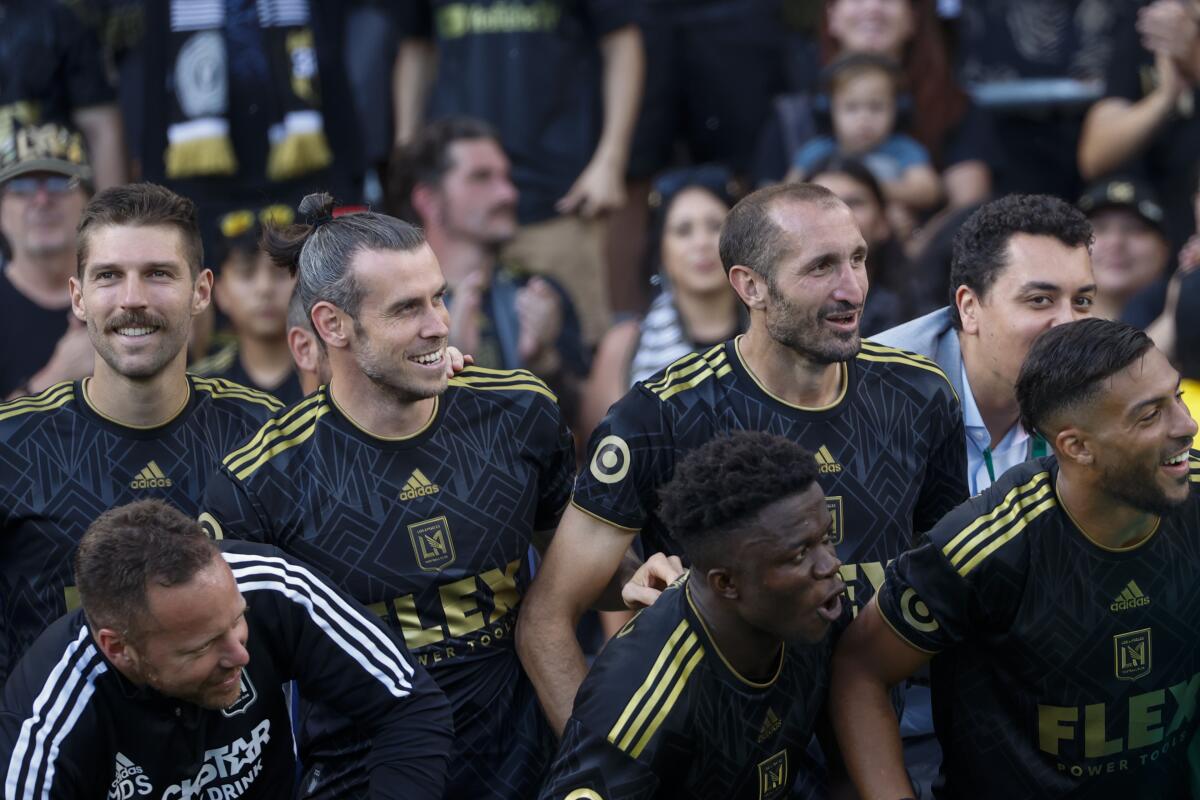
Then there’s the schedule. The eighth- and ninth-place teams in each conference will begin the postseason with play-in games, with the winners advancing to an eight-team first round. This is where things really go off the rails because the first round will be a best-of-three series. Each game will have a winner — ties will be broken by penalty kicks after 90 minutes — with a team needing two victories to advance to the single-elimination knockout stages.
MLS said it favored a three-game first round because it wanted its postseason tournament to have a World Cup feel, and World Cups begin with three games of group play. But World Cup group play has four teams playing one another in a round-robin format; MLS playoffs will have the same teams playing each other as many as three times, with two wins needed to advance.
MLS also wanted every postseason qualifier to have at least one home date, which the new format provides for since the middle game of the first-round, three-game series will be played at the lower seed’s stadium. But the old two-legged format, which MLS abandoned in 2019, also accomplished that. That setup, a home-and-away playoff in which winners were decided on aggregate score, also is used in the Champions League and Europa League tournaments, in the Liga MX playoffs and in virtually every other club soccer tournament in the world.
With its format, MLS again will be standing on its own — and not in a good way.
Then there’s the length of the postseason tournament — a possible 33 games, by far the longest in MLS history. (Each team plays just 34 regular-season games.) And that will follow the most crowded MLS regular season ever, one that will include the U.S. Open Cup and the new Leagues Cup with Mexico’s Liga MX. For LAFC, which also has CONCACAF Champions League and the one-game Campeones Cup, that could mean more than 60 games in about 41 weeks.
Yet MLS hasn’t increased roster sizes to cope with the additional glut of games. So if LAFC does reach the MLS Cup final again, it probably will be limping in.
“It’s a heavy lift,” Galaxy coach Greg Vanney said. “It’ll be interesting to see teams, what their different strategies are inside of that. Some teams are built to have a top 14 and they play the vast majority of the minutes. But that’s a lot for 14 players to carry.
“Some teams are built with a lot more depth and they spread their money a bit wider. They might be built for a longer season but maybe they lack a little bit of quality.”
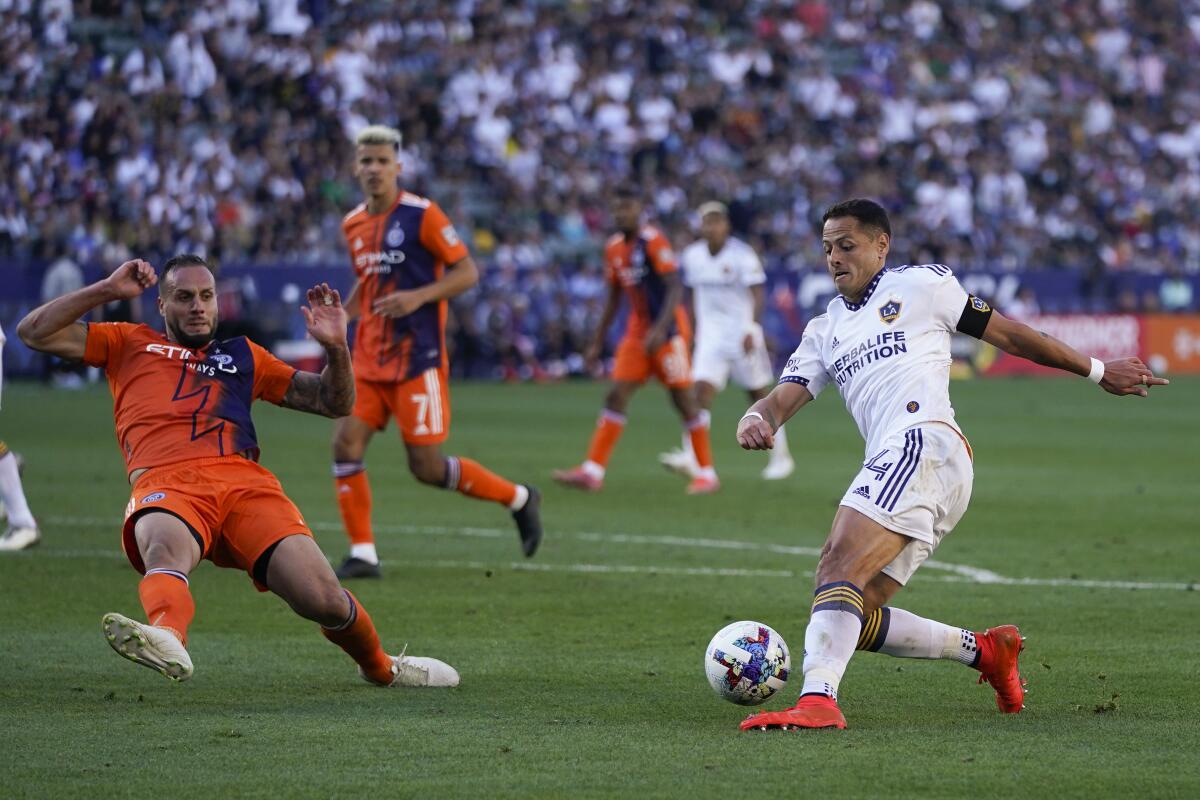
Added Cherundolo: “You’ll see players that didn’t get a lot of playing time last year. I’m sure you’ll see some new faces.”
An MLS official, who wasn’t authorized to speak publicly on the discussions that led to the new playoff system, said the league’s new 10-year, $2.5-billion broadcast deal with Apple TV was not a factor in the change. Apple executives have been open in their desire for added content and enthusiastically have embraced the idea that playoff games produce excitement, but the league official said the new postseason format was being discussed before the Apple TV deal was signed.
“Major League Soccer, in concert with the MLS Product Strategy Committee, undertook a review of the playoff format beginning in 2021 to deliver an enhanced playoff format that would provide fans with more games of consequence and better reward regular-season results while maintaining the best elements from the single-elimination format,” the league said in a statement. “Incorporating fan research and feedback, MLS engaged a third-party expert in the global sports industry to support the process with data and analysis.”
After the first round, the playoff tournament will return to something approaching normalcy with single-elimination games in the conference semifinals, conference final and MLS Cup final.
Enjoying this newsletter? Consider subscribing to the Los Angeles Times
Your support helps us deliver the news that matters most. Become a subscriber.
Is MLS getting too big for its own good?
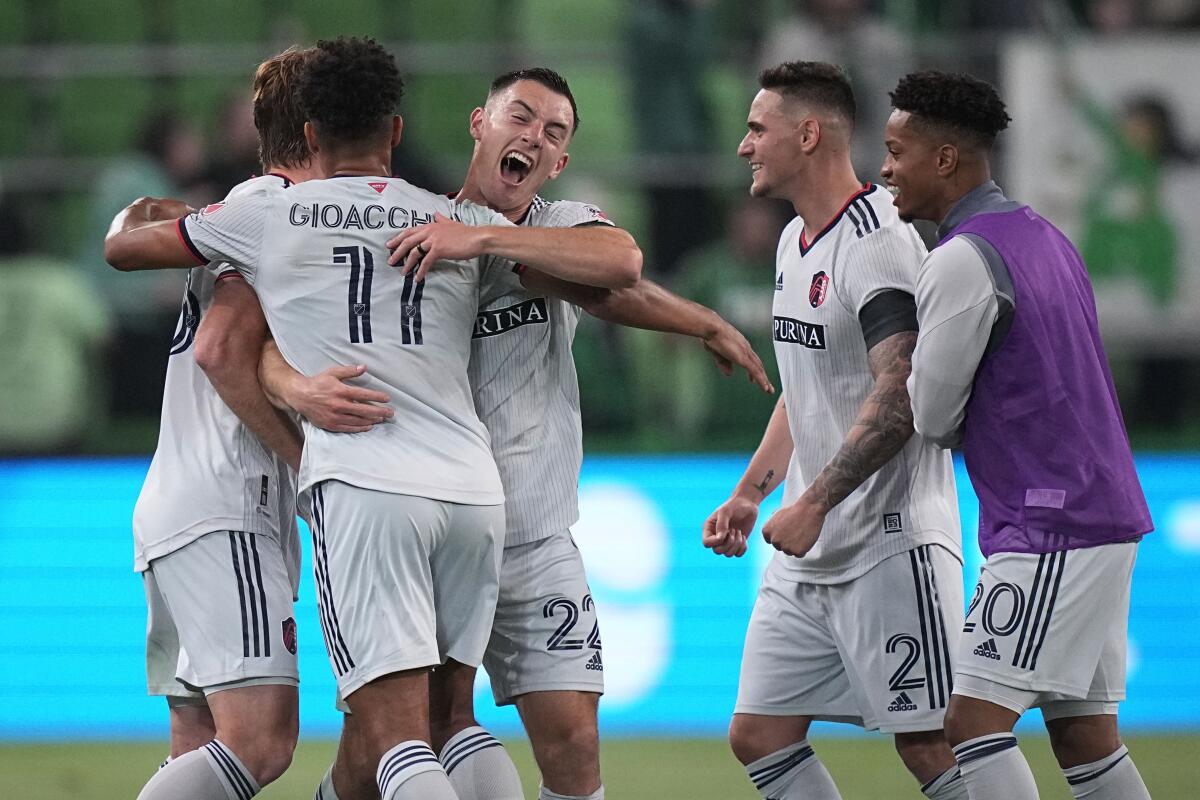
The playoff format isn’t the only thing about MLS that’s expanding. With St. Louis City making its debut Saturday in a 3-2 road win over Austin, the league — already the largest first-division soccer league in the world — has grown to 29 teams. This is the seventh consecutive season MLS has added a team, growing by nine clubs overall.
Commissioner Don Garber said he hopes to announce a 30th team — either Las Vegas or San Diego — this year and even then he won’t be done.
“We have teams across four time zones, multiple climate zones,” Garber said last week. “We do need more teams. We say we’re going to stop at 30, but other major leagues are larger than that.
“I never say never in Major League Soccer. There are many other markets that are opportunities for us.”
MLS is the only one of the five major professional sports leagues in the U.S. that has fewer than 30 teams; the NFL and NHL have the most with 32. But while the NFL is divided into divisions, where teams play a balanced schedule to determine a champion, MLS awards its Supporters’ Shield and home-field advantage in the playoffs to the club with the best regular-season record based on an unbalanced schedule.
The Galaxy, for example, will play LAFC three times this season but only six teams from the Eastern Conference will face the reigning champions even once. LAFC and the Galaxy each play just 19 of the league’s 29 teams.
How is that a fair competition?
Continued expansion could make a balanced schedule even more difficult to achieve. One solution, once the league reaches 30 teams, would be to divide the clubs into three divisions rather than two conferences. Teams would play each division rival twice, home and away, for a total of 18 games, then play 16 games against teams drawn evenly from each of the other two divisions. In that way, each club would be assured of playing 25 of the other 29 teams. Expand the schedule to 38 games and everybody plays everybody at least once.
Not perfect, but closer.
Aside from San Diego and Las Vegas, cities Garber mentioned as possible expansion sites include Sacramento, Detroit, Phoenix and Tampa Bay.
Record opening weekend — but a day off for the Galaxy, LAFC
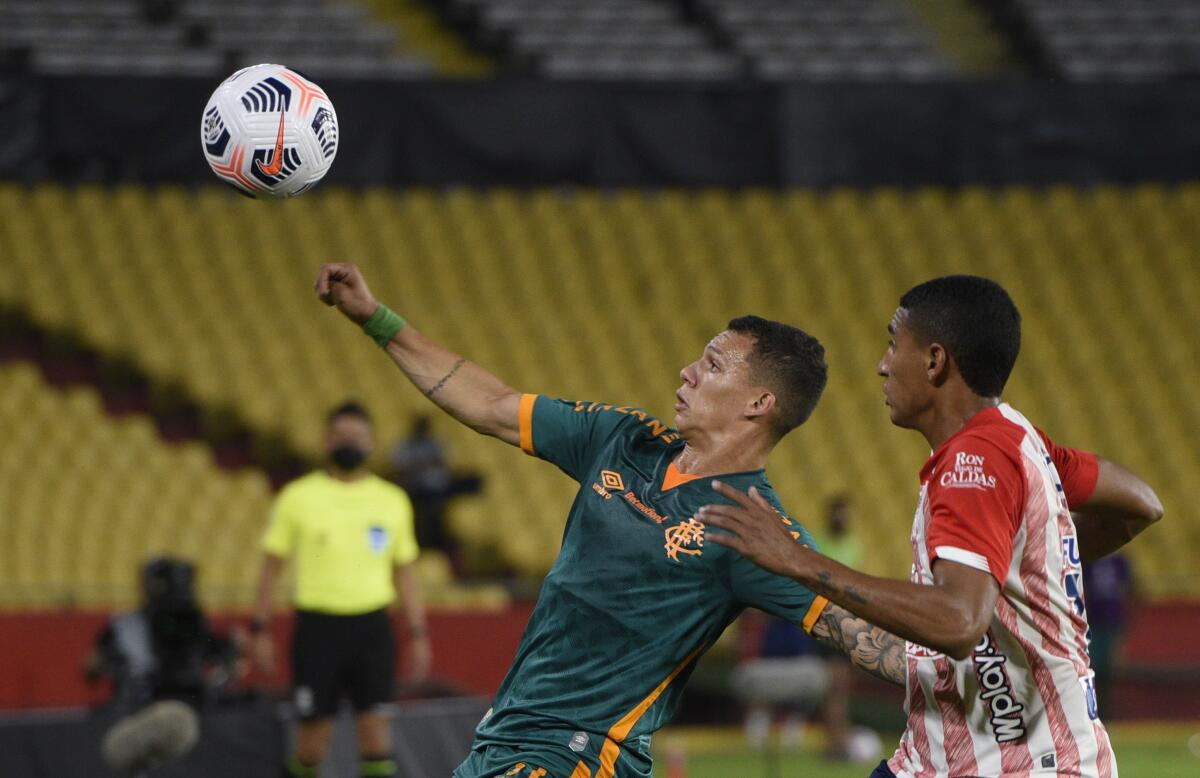
The Galaxy and LAFC were two of four teams that did not play on MLS’ opening weekend since their El Tráfico rivalry game at the Rose Bowl was postponed because of inclement weather. That game was rescheduled for July 4.
(Sporting Kansas City played in Portland on Monday night after that game was postponed two days by weather.)
The delay might prove advantageous to the Galaxy. Their captain, Javier “Chicharito” Hernández, had ruled himself out of the opener with a hamstring issue. He could be ready for the team’s new season opener Saturday in Dallas.
The delay also gave Vanney, the team’s coach and sporting director, additional time to make some important roster decisions. The team on Monday announced the signing of Lucas Calegari, a 21-year-old Brazilian from Fluminense, as the replacement for departed right back Julián Araujo. The acquisition comes on a loan with a permanent transfer option and Calegari will occupy a U-22 roster spot. He must obtain a P-1 visa and international transfer certificate before he can be added to the roster.
And Vanney might not be done. The team is rumored to be seeking a deal with former Real Madrid midfielder Isco, who is a free agent.
Here are some important salary rules for 2023:
• $5.21 million: Budget cap per team (covering roster slots 1-20).
• $85,444: Senior minimum salary (slots 21-24).
• $67,360: Reserve minimum salary (slots 25-30).
• $651,250: Maximum budget charge.
• $1.651,25 million: Maximum TAM salary.
• $1.9 million: Annual GAM allotment per team.
• $2.72 million: Annual TAM allotment per team
Source: Soccer America
As for the teams that did play last weekend, Charlotte drew 69,345 fans for its 1-0 loss to New England while Atlanta had 67,538 in Mercedes-Benz Stadium in its 2-1 victory over San Jose. That’s the first time two MLS games drew more than 65,000 fans on the same day. If the Rose Bowl game had gone forward, it would have been three games since more than 70,000 had been distributed for the match. Those tickets will be honored for the July 4 game.
Youth is served: U-17 team going back to World Cup
With a victory over Guatemala in the quarterfinals of the CONCACAF Championships, the men’s U-17 national team qualified for the World Cup for the 18th time, more than any other country. The U.S. went on to beat Canada 2-0 in the semifinals before losing to Mexico 3-1 in Sunday night’s final.
But if getting to the World Cup has been the easy part, things generally have gotten a bit more complicated once the team is there: The U.S. has made it past the round of 16 just once since 2005. The Americans have failed to get out of group play in two of the last three tournaments.
This year’s team includes players from both of Southern California’s MLS teams in LAFC defender Christian Diaz and Galaxy midfielder Paulo Rudisill.
The U.S. U-20 team qualified for the World Cup this spring by winning its third consecutive CONCACAF title last year. That victory also earned the U.S. a berth in next year’s Paris Olympics. The U.S. hasn’t sent a men’s team to the Olympics, which is an age-group tournament, since 2008.
For Alex Morgan, every day is Mother’s Day
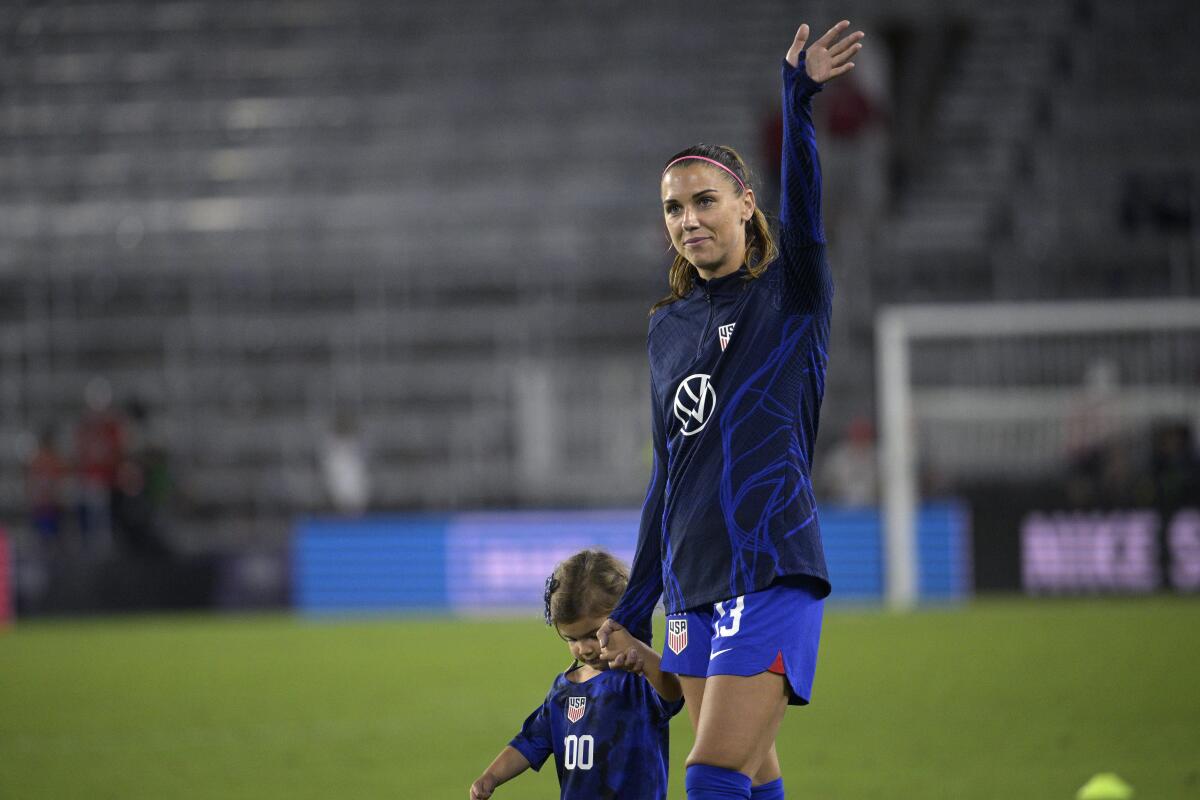
With her goal in last week’s 2-1 win over Brazil in the final game of the SheBelieves Cup, Alex Morgan became the highest-scoring soccer mom in national team history. The goal was the 121st of Morgan’s international career but the 14th since she gave birth to daughter, Charlie Elena Carrasco, in May 2020, breaking a tie with Joy Fawcett for most goals by a USWNT mom.
It also left Morgan, who finished second to Spain’s Alexis Putellas on Monday in voting for FIFA’s world player of the year, with either a goal or an assist in each of her last four appearances with the U.S. team.
“It’s just incredible — to be able to do what she’s doing on the field, and have a child, and do it all and have it all, is just insane,” teammate Megan Rapinoe told reporters.
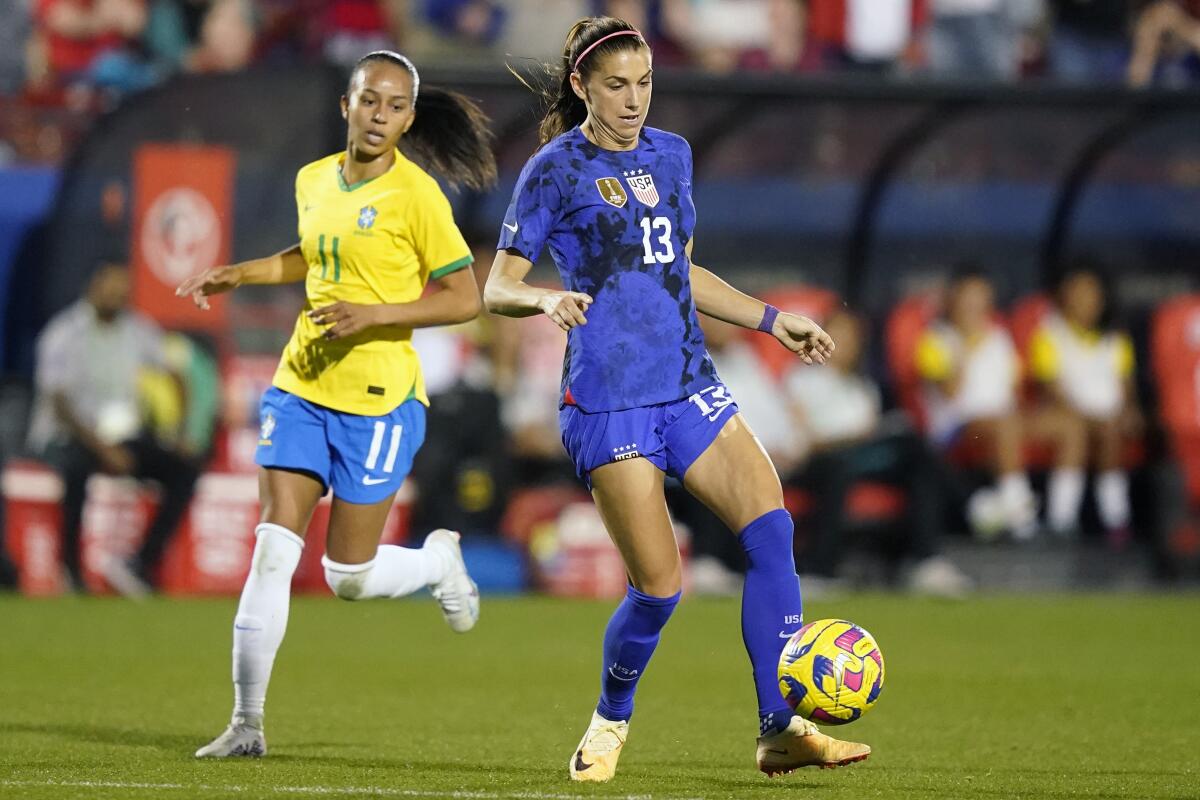
Morgan has made a habit of bringing Charlie onto the field after games to run around, dribble a soccer ball and take it all in. She then clings to her mom in the mixed zone as Morgan talks with reporters.
“Hopefully one day she’ll understand it and look back and see photos of herself running on the field and realize that’s not normal at all,” Morgan said. “She said she’s having so much fun. So I guess she understands a little bit.”
Coach Vlatko Andonovski is having fun, too. The SheBelieves sweep ran his record with the USWNT to 47-5-6. But he’s coached Morgan only as a mother.
“She’s a true winner,” he said. “She’s a great leader, and she always comes through when you need her as a player, but also as a mom. It’s very inspiring for a lot of females that want to have kids and want to come back and play. Obviously, she’s not the first one, but for her to model that and continue doing that is great.
“We enjoy having Charlie and all the others in the environment.”
As good as Morgan’s curling left-footed strike was, Mallory Swanson’s goal 15 minutes later proved to be the game winner for the U.S., which won the four-team SheBelieves for the sixth time in eight tries. Swanson’s goal, in the 63rd minute, was her seventh of 2023 and gave her scores in six consecutive games. It also was her eighth in SheBelieves play and made her the tournament’s most prolific scorer.
Brazil’s goal, in the 90th minute, was the only score the U.S. gave up in its three tournament games against Canada, Brazil and Japan, who are ranked in the world’s top 11 by FIFA.
Moving on
This is the 224th (I’ve been counting) and final edition of the weekly L.A. Times soccer newsletter.
It was launched in 2018, in the wake of the World Cup in Russia, and initially, for me at least, was little more than a source of unwanted additional labor. It since has become a labor of love, a place where I not only could report on — and sometimes opine on — topics of obvious importance, but also a place where I could write in length on college soccer, second-division teams and leagues in the U.S. and sometimes just wacky, offbeat things that were flying under the radar.
With the sunsetting of the newsletter, that place is now closed. It will be replaced by a dedicated column on soccer, which will be published each Tuesday. Given the constraints of print, the column will be much shorter and more limited in scope.
For those who found the newsletter valuable, I am aware its loss comes at an unfortunate time with the next North American World Cup less than three years away — and with the next Women’s World Cup less than five months away. It also comes at a time when soccer coverage in the U.S. is contracting; a month ago Vox Media, which owns SB Nation, announced layoffs that gutted its MLS coverage.
The L.A. Times still will be writing on MLS and the NWSL, we’ll still cover the men’s and women’s national teams, the European leagues and Mexican soccer, just in a different way.
And finally, thanks to clandestine freelance copy editor Larry Morgan, a retired soccer/staff writer with the San Gabriel Valley Tribune. Larry edited my copy when I first started working in professional journalism in 1977. Why he agreed to subject himself to that again 46 years later, I don’t know. But his help was deeply appreciated, and I owe him many meals at Fatburger, which is his preferred method of payment.
And finally there’s this …
U.S. Soccer Federation president Cindy Parlow Cone was appointed Saturday to the CONCACAF Council, the confederation’s strategic and oversight body …. Jurgen Klinsmann, who coached Germany in the 2006 World Cup and the U.S. in the 2014 tournament, was named coach of the South Korean national team for the 2026 cycle. ... The Orange County Soccer Club, which plays in the second-tier USL Championship, has entered into a long-term partnership with Feyenoord of the Dutch Eredivisie in which the teams will work together on loans and the development and identification of talent. Feyenoord’s CEO is former Galaxy general manager Dennis te Kloese. … The Major Arena Soccer League is expanding to Guadalajara this fall. The addition of the Guadalajara Tequileros FC will give the league 15 teams, including three in Mexico. The Monterrey Flash and Chihuahua Savage are the other two Mexican franchises. The MASL also has two Southern California teams in the San Diego Sockers and Empire Strykers, who are based in Ontario.
Podcast
Don’t miss my weekly podcast on the Corner of the Galaxy site as co-host Josh Guesman and I discuss the Galaxy each Monday. You can listen to the most recent podcast here.
Quotebook
“It was one of the important games in my career, it was the first one in MLS as well. … What we did today was unbelievable.”
Brazilian forward João Klauss, whose goal in the 86th minute gave St. Louis City a 3-2 win over Austin in the team’s MLS debut
Until next time...
Stay tuned for future newsletters. Subscribe here, and I’ll come right to your inbox. Something else you’d like to see? Email me. Or follow me on Twitter: @kbaxter11.
Go beyond the scoreboard
Get the latest on L.A.'s teams in the daily Sports Report newsletter.
You may occasionally receive promotional content from the Los Angeles Times.




